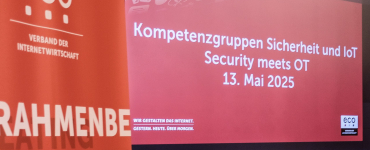Some of the promises that we’ve been hearing about for a long time now are finally coming to fruition, says Harald A. Summa, CEO at eco. In an interview, he explains what role the latest Internet trends play and how companies and their employees can benefit from them.
Mr. Summa, the Internet trends for 2018 are smart ecosystems, Artificial Intelligence, blockchain, and New Work. Other important terms are: the Internet of Things, smart home, smart city, industrial IoT, and cloud computing. How do these terms interrelate with each other?
I can see how the Internet is finally delivering on some of the promises that we’ve been hearing about, and I believe that there are a lot of good things happening when it comes to these topics. Let’s take the keyword “smart”. For a long time, the refrigerator had to serve as the example of a smart world, a world in which a refrigerator orders the milk itself that nobody apparently wants. This has changed. Word has spread that smart solutions may not only be very practical, but are also vital for survival in light of the growing number of people who want to – and should be able to – partake in prosperity.
Consider the areas of agriculture and energy. Both of these meet very basic needs, and we will have to operate them much more efficiently in the future. And that will also actually be possible, due to smart solutions. If you understand that, then you have grasped that smart does not mean that a few nerds have refrigerators that order their own milk. It’s that everyone gets enough to eat.
Partaking in prosperity is increasingly synonymous with partaking in digital value creation. Many people regard this as being a difficult long-term prospect. What is your advice for companies and their employees? What can they do to keep up with the next stage of digitalization?
Expand their competencies. What’s particularly important here is the desire to develop something new and the confidence to create it. That may sound a bit general, but I can break it down to very specific tasks. For companies, the aim is to create structures that are flexible enough to react to new developments – and at the same time not to just steer straight ahead; think less about goals and more about problem areas and ways of getting around them.
In keeping with this approach, look for team members who can think non-linearly. One example is the employee who does not try to be indispensable, but instead works on automating his or her own work processes or, even better, on the best way to automate the entire company. The employee who thinks this way is freed from a territorial mindset and in the ideal case is recommended for higher-level roles – before someone else comes along and makes him or her and the services he or she provides surplus to requirements.
Recently, we’ve been getting lots of positive reports concerning the German economy: tax revenues, exports, employment rate, and economic growth, for example. But at the same time, other countries are ahead of us on the road to becoming a Gigabit Society. Are we simply too comfortable?
I’m not one of those people who starts ringing alarm bells when I hear reports of success. I think we are also entitled to be happy about an achievement. We have the best prerequisites to be at the forefront of digitalization. Particularly when it comes to the trend topics of 2018, we still have time to definitively stake our claim. We are well-positioned in the industrial Internet of Things and in cloud computing, and we can exploit locational advantages such as our high level of data protection.
But digitalization is not a matter of course, and basic conditions are changing the business, as we can observe in Frankfurt, for example. Frankfurt is one of Europe’s top three locations for the data center industry. Only Amsterdam and London can still compete in this league, with London looking to the future with anything but optimism. The reason for this is purely political: Brexit.
To answer your question: No, we are certainly not too comfortable. But we should take advantage of our fortunate situation and invest more in our digital future. A lot more.




